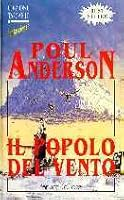The People Of The Wind, XI.
We contemplate cosmic time scales in works by Olaf Stapledon and Poul Anderson, then focus on specific details in a single passage in one novel by Anderson but this is precisely what I appreciate: vast spatiotemporal scales combined with minute inexhaustible details.
The President of the Parliament of Man on Avalon tells Admiral Holm:
"'...the winds of change are blowing.'" (p. 567)
- and Holm responds with:
"'-their finest hour-'" (ibid.)
Maybe we can cite this as yet another intervention by the wind in an Andersonian text? I have always found the phrase, "winds of change," extremely evocative and it has a history, revealed by googling.
"-their finest hour-" is meaningful to people in Britain. My parents' generation heard it spoken.

5 comments:
Kaor, Paul!
And I disliked how First March Warden Holm applied that Churchillian quote. The Imperials were nothing like the Nazis, so it grated on me.
Ad astra! Sean
Sean: well, yeah, but the Avalonians were also fighting against heavy odds to preserve their independence.
My objection would be that the British didn't -defeat- the Germans in 1940, they just -stood them off-.
It required recklessly foolish actions by the German leadership -- getting into simultaneous wars with the USSR and the USA -- to convert this into defeat.
Kaor, Mr. Stirling!
True, what you said about the Avalonians fighting to remain a part (not independent) of the Domain.
Again true, what you said about the UK in 1940. I have read that Goering's biggest mistake was switching the Luftwappe from fighting and destroying the RAF to useless bombing of civilian targets. IIRC, Churchill estimated two more weeks of German attacks on the RAF and its air bases would have broken it, and maybe opening the way to a Wehrmacht invasion of Britain.
Absolutely, what you said about the strategic bungling of the Germans! War with the USSR should have waited till the war in the west was settled. And there was no need for Hitler to declare on the US, even if he thought that was inevitable, why hasten it?
Ad astra! Sean
Sean: correct. I think by 1941 Hitler was inclined to reckless gambles. He'd wanted to do a deal with the British in 1940, after the fall of France, to get British neutrality and hence keep the USA out. And anyone but Churchill would probably have done the deal; objectively speaking, Britain's prospects were bleak.
Then he intended to turn on Russia. But in the event, he couldn't stop himself from doing it even without clearing the decks.
Kaor, Mr. Stirling!
I agree, Hitler let impatience get the better of caution and strategic sense.
Ad astra! Sean
Post a Comment